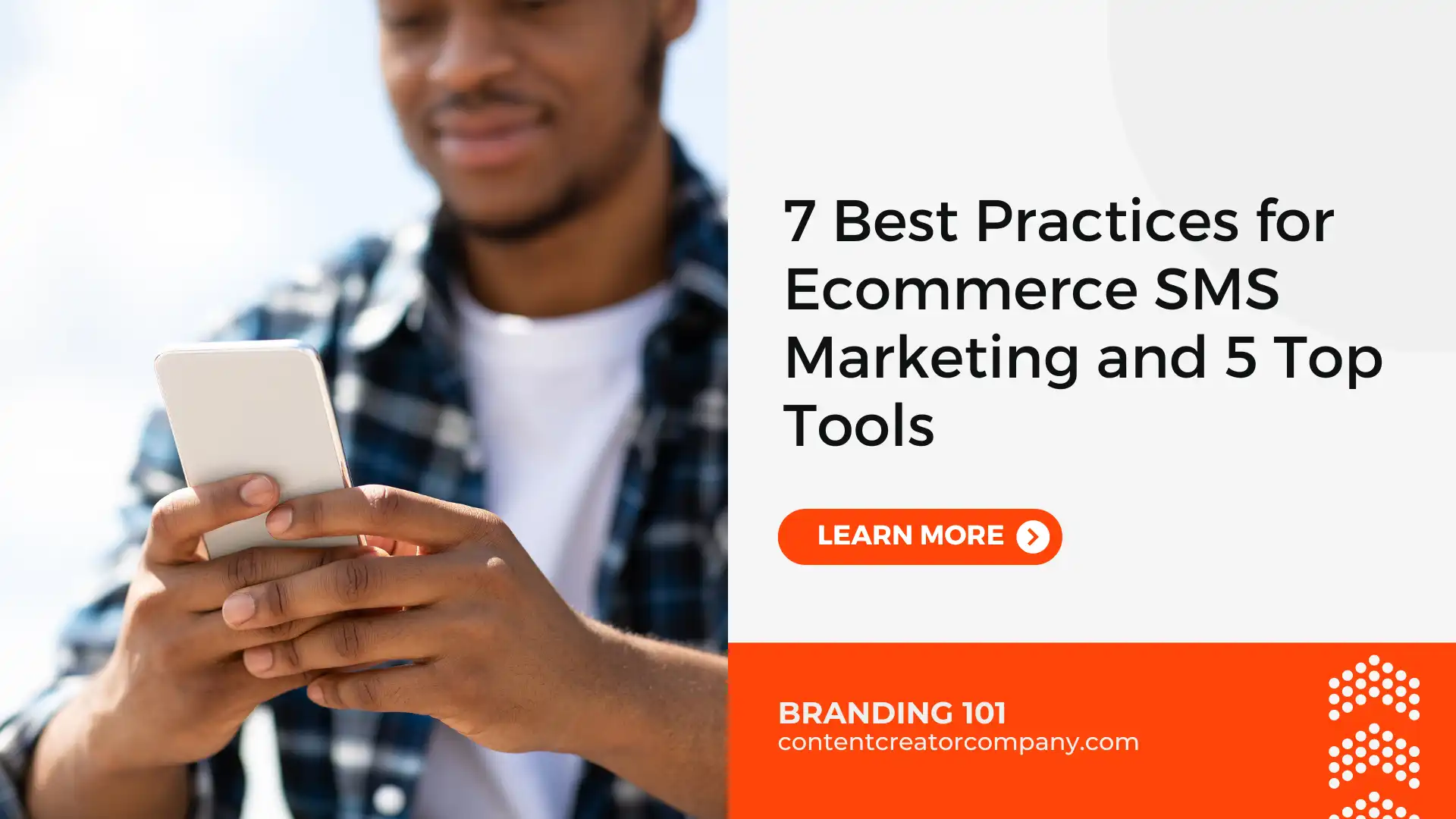
Consumers are bombarded with countless marketing messages across various channels, SMS marketing stands out as a powerful tool to cut through the noise and directly reach your target audience.
With its high open rates and immediate delivery, SMS (Short Message Service) marketing has proven to be an effective way to capture attention, drive conversions, and foster customer loyalty.
SMS marketing is a game-changer for ecommerce businesses because it taps into the ubiquitous nature of mobile phones. People are glued to their devices, and a well-crafted SMS message can instantly grab their attention, resulting in higher engagement and potentially increased sales.
Additionally, SMS marketing offers a more personal and direct connection with customers, fostering a sense of trust and familiarity with your brand.
Ready to revolutionize your ecommerce marketing strategy? Dive into this comprehensive guide on leveraging e-commerce SMS marketing for your online store. Discover the best practices and top tools to drive engagement, conversions, and customer loyalty.
Table of Contents
What is SMS Marketing?
SMS marketing, or short message service marketing, is a form of marketing that involves sending promotional messages or alerts to customers via text messages. It leverages the ubiquity and accessibility of mobile phones to deliver targeted messages directly to individuals’ personal devices.
SMS marketing has become increasingly popular due to its immediacy, high open rates, and effectiveness in reaching customers wherever they are.
One of the primary advantages of SMS marketing is its immediacy. Unlike other forms of marketing such as email or social media, which may go unread for hours or days, text messages are typically read within minutes of being received.
This immediacy allows businesses to quickly communicate time-sensitive information such as flash sales, promotions, or event reminders.
Furthermore, SMS marketing boasts high open rates compared to other marketing channels. Studies have shown that the majority of text messages are opened within minutes of being received, with some reports suggesting open rates as high as 98%.
This high level of engagement makes SMS marketing an effective way to ensure that your messages are seen by your target audience.
SMS marketing also offers a high level of personalization and targeting. Businesses can segment their audience based on factors such as demographics, location, or past purchase behavior, allowing them to tailor their messages to specific groups of customers.
With this targeted approach, SMS marketing can help increase the relevance of the messages and can lead to higher conversion rates.
Additionally, SMS marketing is cost-effective compared to traditional forms of advertising such as television or print media. Sending bulk SMS messages is relatively inexpensive, making it accessible to businesses of all sizes, including small businesses with limited marketing budgets.
However, it’s important for businesses to use SMS marketing responsibly and ethically. Overuse or misuse of SMS marketing can lead to customer irritation or even legal consequences.
It’s essential to obtain explicit consent from customers before sending them promotional messages and to provide them with an easy way to opt out of receiving further communications.
Is SMS Marketing Still Effective for Ecommerce?
Yes, SMS marketing remains highly effective for ecommerce businesses, even in the current digital landscape. Here’s why:
High Open Rates: SMS messages have exceptionally high open rates, often exceeding 98%. This means that the vast majority of recipients will see your message, making it an ideal channel for time-sensitive promotions or important updates related to ecommerce activities.
Immediacy: Text messages are typically read within minutes of being received, providing ecommerce businesses with a direct and immediate way to communicate with customers. This immediacy is particularly valuable for promoting flash sales, limited-time offers, or new product launches.
Increased Engagement: SMS marketing can foster higher levels of engagement compared to other channels. Customers tend to be more responsive to text messages, making it easier for ecommerce businesses to initiate conversations, gather feedback, or provide personalized recommendations.
Personalization: Ecommerce businesses can leverage data insights to personalize SMS messages based on factors such as past purchase history, browsing behavior, or geographic location. Personalized messages are more relevant to recipients, increasing the likelihood of conversion.
Convenience: SMS marketing offers a convenient way for customers to engage with ecommerce brands. With mobile devices always within reach, customers can easily receive and act upon SMS promotions, whether it’s making a purchase, redeeming a discount code, or accessing exclusive content.
Complementary to Other Channels: SMS marketing can complement and enhance other marketing channels such as email, social media, or paid advertising.
By integrating SMS with existing marketing strategies, ecommerce businesses can create cohesive omnichannel experiences that drive engagement and sales.
Opt-In Nature: SMS marketing relies on recipients opting in to receive messages, ensuring that communications are targeted and relevant.
This opt-in nature helps to maintain a higher level of engagement and prevents spamming, ultimately fostering stronger relationships between ecommerce brands and their customers.
While SMS marketing continues to be an effective strategy for ecommerce businesses, it’s essential to use this channel responsibly and respect customers’ preferences.
By delivering valuable, personalized content and adhering to best practices, ecommerce brands can maximize the effectiveness of SMS marketing in driving conversions, increasing customer loyalty, and growing their business.
Best Practices for Ecommerce SMS Marketing

To unlock the full potential of SMS marketing for your ecommerce business, it’s essential to follow best practices that ensure compliance, engagement, and effectiveness.
1. Obtain Proper Consent
Before diving into SMS marketing, make sure you have the explicit consent of your subscribers. Respect their privacy and provide a clear opt-in process, allowing them to choose if they want to receive your SMS updates. Failure to do so can result in legal consequences and damage your brand’s reputation.
2. Segment Your Audience
Just like any other marketing channel, segmentation is key to delivering relevant and targeted messages.
Segment your SMS subscribers based on factors such as demographics, purchase history, and engagement levels. This way, you can tailor your messages to specific groups, increasing their relevance and impact.
3. Create Compelling Messages
SMS messages are limited in character count, so it’s crucial to craft concise and compelling content that grabs attention and drives action.
Use persuasive language, highlight offers or promotions, and include a clear call-to-action (CTA) that encourages recipients to take the desired action, whether it’s making a purchase, visiting your website, or engaging with your brand.
4. Timing is Key
Timing plays a significant role in the success of your SMS marketing campaigns. Analyze your audience’s behavior patterns and send messages during peak engagement hours for maximum visibility and impact.
Additionally, consider leveraging real-time data and triggers, such as abandoned cart reminders or post-purchase follow-ups, to deliver timely and relevant messages.
5. Personalize Your Communication
Personalization is a powerful tool in marketing, and SMS is no exception. By leveraging customer data and segmentation, you can customize your messages with personalized greetings, product recommendations, or tailored offers.
This level of personalization not only enhances the customer experience but also increases the likelihood of engagement and conversions.
6. Offer Incentives and Deals
Who doesn’t love a good deal? Incentives and special offers are great motivators for customers to take action. Use your SMS campaigns to share exclusive discounts, limited-time promotions, or early access to new products. This not only drives sales but also fosters customer loyalty and repeat business.
7. Track and Analyze Metrics
As with any marketing initiative, measuring and analyzing performance is crucial for optimizing your SMS campaigns. Track metrics such as delivery rates, open rates, click-through rates, and conversion rates.
Use this data to identify what’s working and what needs improvement, and continuously refine your strategies for better results.
Top SMS Marketing Tools for Ecommerce

While there are numerous SMS marketing tools available, some stand out as top choices for ecommerce businesses. Here are a few popular options:
1. Klaviyo
Klaviyo is a comprehensive marketing automation platform that offers robust SMS marketing capabilities. With its advanced segmentation and personalization features, you can create highly targeted SMS campaigns that drive engagement and conversions.
2. Postscript
Postscript is a user-friendly SMS marketing tool designed specifically for ecommerce businesses. It offers features like abandoned cart reminders, order notifications, and SMS popups, enabling you to engage customers at every stage of the buyer’s journey.
3. SMSBump
SMSBump is a powerful SMS marketing tool that integrates seamlessly with popular ecommerce platforms like Shopify and WooCommerce. It provides features like automated campaigns, cart abandonment recovery, and detailed reporting to help you maximize your SMS marketing efforts.
4. Attentive
Attentive is a mobile messaging platform that specializes in SMS marketing for ecommerce brands. With its intuitive interface and advanced targeting capabilities, you can create personalized SMS campaigns that drive sales and foster customer loyalty.
5. SlickText
SlickText is a comprehensive SMS marketing solution that offers a wide range of features, including autoresponders, drip campaigns, and integrations with popular ecommerce platforms. Its user-friendly interface and robust reporting make it a popular choice among ecommerce businesses.
Integrating SMS Marketing with Other Channels
SMS marketing is a powerful tool on its own, integrating it with other marketing channels can amplify its effectiveness and create a seamless customer experience.
1. Combine With Email Marketing
Email marketing and SMS marketing can work hand-in-hand to reinforce your messaging and increase engagement. Use SMS to drive urgency and prompt immediate action, while leveraging email for more detailed content and promotions.
2. Using Social Media
Social media platforms offer endless opportunities for brand awareness and customer engagement. Integrate your SMS marketing campaigns with your social media efforts by promoting SMS opt-ins, sharing exclusive offers, or running contests and giveaways that encourage subscribers to join your SMS list.
Measuring Success and Optimizing Campaigns
Key Performance Indicators (KPIs)
To measure the success of your SMS marketing campaigns, it’s essential to identify and track key performance indicators (KPIs). Common KPIs for SMS marketing include delivery rates, open rates, click-through rates, conversion rates, and return on investment (ROI).
A/B Testing
A/B testing is a powerful technique that allows you to compare the performance of different variations of your SMS campaigns. Test elements like messaging, timing, incentives, and CTAs to identify what resonates best with your audience and continuously optimize your strategies.
Continuous Improvement
SMS marketing is an ongoing process, and continuous improvement is key to staying ahead of the curve. Regularly analyze your campaign performance, gather customer feedback, and stay up-to-date with industry trends and best practices.
This will help you refine your strategies and adapt to changing consumer behaviors and preferences.
Best Practices for Ecommerce SMS Marketing Conclusion
SMS marketing is a powerful tool for ecommerce businesses looking to cut through the noise and directly engage with their target audience.
By following best practices, leveraging top SMS marketing tools, and integrating SMS with other channels, you can create compelling campaigns that drive sales, foster customer loyalty, and ultimately boost your bottom line.
Remember, SMS marketing is not a one-size-fits-all approach – it requires a strategic and personalized approach tailored to your brand and audience. Embrace the power of SMS marketing, and watch your ecommerce business thrive in the competitive digital landscape.
FAQs on Best Practices for Ecommerce SMS Marketing
Is SMS marketing legal?
Yes, SMS marketing is legal as long as you obtain proper consent from subscribers and comply with applicable laws and regulations, such as the Telephone Consumer Protection Act (TCPA) in the United States.
How do I build an SMS subscriber list?
You can build your SMS subscriber list by promoting SMS opt-ins on your website, social media channels, in-store displays, or during the checkout process. Always make it clear what kind of messages subscribers will receive and provide an easy way to opt out.
How frequently should I send SMS campaigns?
The frequency of your SMS campaigns depends on your audience’s preferences and the nature of your messages.
It’s generally recommended to avoid bombarding subscribers with too many messages, as this can lead to opt-outs and decreased engagement. Find a balanced approach that provides value without being overwhelming.
Can I use SMS marketing for abandoned cart reminders?
Yes, SMS marketing is an excellent channel for sending abandoned cart reminders. These timely reminders can help recover potential sales by prompting customers to complete their purchases.
How do I measure the success of my SMS marketing campaigns?
Success can be measured by tracking key performance indicators (KPIs) such as delivery rates, open rates, click-through rates, conversion rates, and return on investment (ROI). Most SMS marketing tools provide detailed reporting to help you analyze and optimize your campaigns.
Can I integrate SMS marketing with my email marketing campaigns?
Absolutely! Integrating SMS marketing with email marketing can amplify your messaging and create a seamless customer experience. Use SMS to drive urgency and prompt immediate action, while leveraging email for more detailed content and promotions.
Are there any best practices for crafting compelling SMS messages? Yes, there are several best practices to follow when crafting compelling SMS messages:
- Keep messages concise and to the point
- Use persuasive language and highlight offers or promotions
- Include a clear call-to-action (CTA)
- Personalize messages for increased relevance
- Leverage urgency and scarcity to drive action
How can I ensure compliance with SMS marketing regulations?
To ensure compliance with SMS marketing regulations, always obtain proper consent from subscribers, provide an easy opt-out mechanism, clearly identify your business in each message, and follow applicable laws and guidelines, such as the TCPA in the United States.
Unlock the Potential of SMS Marketing for Your E-commerce Business
Building a successful SMS marketing campaign requires more than just reaching your customers – it demands a cohesive brand identity that resonates with them on a personal level.
Our team specializes in crafting brand identities that establish trust, loyalty, and recognition, ensuring that every text message reflects the essence of your brand.
From developing a distinct brand voice to creating visually engaging content, we’ll help you stand out in your customers’ inboxes and drive conversions like never before. Partner with us today and let’s elevate your SMS marketing strategy to new heights of success!





